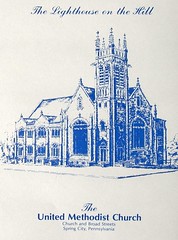There Will Be A Future
September 30, 2007
from Jeremiah 32
My sermon outline:
• Ancient property transaction. Seller (w/in family). Deed, signed, sealed, witnessed. Money exchange in public. Record kept in a safe place.
Some context at beginning of passage (Jeremiah under house arrest, city under attack, year wrt contemporary kings)
• Additional context: year is about 587 BC (about 2600 years ago), in Jerusalem, 3 miles from Jer’s hometown of Anathoth. Jeremiah has been serving the Lord for 20-30 years (back up from now to Rev. Jenkins. Recall what this church was like 20-30 years ago...)
• Jerusalem is under siege, has been occupied for ten years by the Babylonian army. Zedekiah is king, but he was put there by the Babs, and doesn’t really hold much power. Ten years earlier (597 BC) the Babs arrested and deported the king. The queen. A number of officials and citizens. Took them six hundred miles away. And 130 years earlier (that’s our congregation’s entire history plus a bit) half of Israel was destroyed by the Assyrians.
It’s not a hopeful point in history.
• Jeremiah is under house arrest for having reported the word of the Lord: that Zedekiah’s rule is about to end, he’ll be conquered by the Babylonians, and that resistance to the Babs will fail.
• And the word of the Lord came to Jeremiah: Your cousin is gonna offer to sell you a field. Buy it.
He’s under house arrest in a city that’s been militarily occupied for ten years, under arrest for prophesying the immanent destruction of the city. Property value is not good. If you’re a landowner in this time and place (if you’re still around) it’s time to get out!
It’s not time to buy! Not a good idea. Doesn’t make any sense. Irrational. Foolish. Wasteful. Denying reality.
• “God told me to do this.” Bad idea. Bad investment. Investment: purchase something now that is expected to increase in value. You’re doing opposite. Guaranteed loss.
• Jeremiah doesn’t care about that, Jer cares about listening to God. He’ll put his money on the line. His reputation. His energy. These do not keep him from following God. Only thing that matters is what God says, and God says There Will Be A Future.
You may not be able to see it, but TWBAF. Faith is the substance of things unseen (Heb 11:1). May look foolish & irrational but TWBAF. We walk by faith & not by sight (2 Cor 5:7) I know the plans I have for you; plans to prosper you and not to harm you; plans to give you hope and a new future. (Jer 29:11) God says TWBAF.
• Some of you may know who Doug Wead is. DW is an author, presidential historian, philanthropist, businessman. CoFounder of one of the largest international relief and humanitarian organizations, Mercy Corps. Back in 91 or 92, after the end of the Cold War, Doug Wead was speaking to a group of independent business owners in Kazakhstan, where free market had just been introduced. Wead tells about the motivation of these business owners, who knew that with all their efforts, they still would never get out of debt. They knew that with all their efforts, their children might not know economic freedom. They were motivated by the possibility that their children’s children might know economic opportunity and prosperity.
• God asked Jeremiah to buy a field in a land that was about to be overcome by foreigners as a witness and testimony to the not-distant future when houses and fields and vineyards would be once again bought in Israel. Jeremiah may never have seen the fruit of his investment, but that day came in the lifetime of his children, in 537 BC.
• I don’t believe we’ll have to wait that long. There are some tough and inevitable things in our future, that we can’t deny. Some of you may not see the revival of this church. But our future is redeemable. I know because God is touching people here and around us. In the last few years even in this region, churches have been born and have produced fruit – we’re not in a desert. We have the ability to affect our image and our body to the glory of God and in cooperation with God.
This text is about betting on the future, which belongs to the expectations, the make-up, the discipline of the community of faith. It is about a risky act of trust and hope, based on the promise of God that we will not be abandoned or forsaken, but that God invites us into living covenant with him. This chapter is about the marvelous power of God to effect a surprising future, to effect a radical reversal of present reality. These things, God can do and God does do.
Our job is to listen to God and not be overwhelmed by circumstances, to invest, in body, mind, pocketbook, and soul, to trust that TWBAF, that houses and fields and vineyards shall be bought in this land, that Sunday school rooms shall be filled with children and that pews shall be filled with families, because we are bought and redeemed by the great redeemer Jesus Christ, whose name we bear and whose glory we sing.
13In the presence of God, who gives life to all things, and of Christ Jesus... I charge you 14to keep the commandment without spot or blame until the manifestation of our Lord Jesus Christ, 15which he will bring about at the right time—he who is the blessed and only Sovereign, the King of kings and Lord of lords.
• Hymn 526: What A Friend We Have in Jesus
- Pastor Kerry
This Sunday: 60 in worship.

